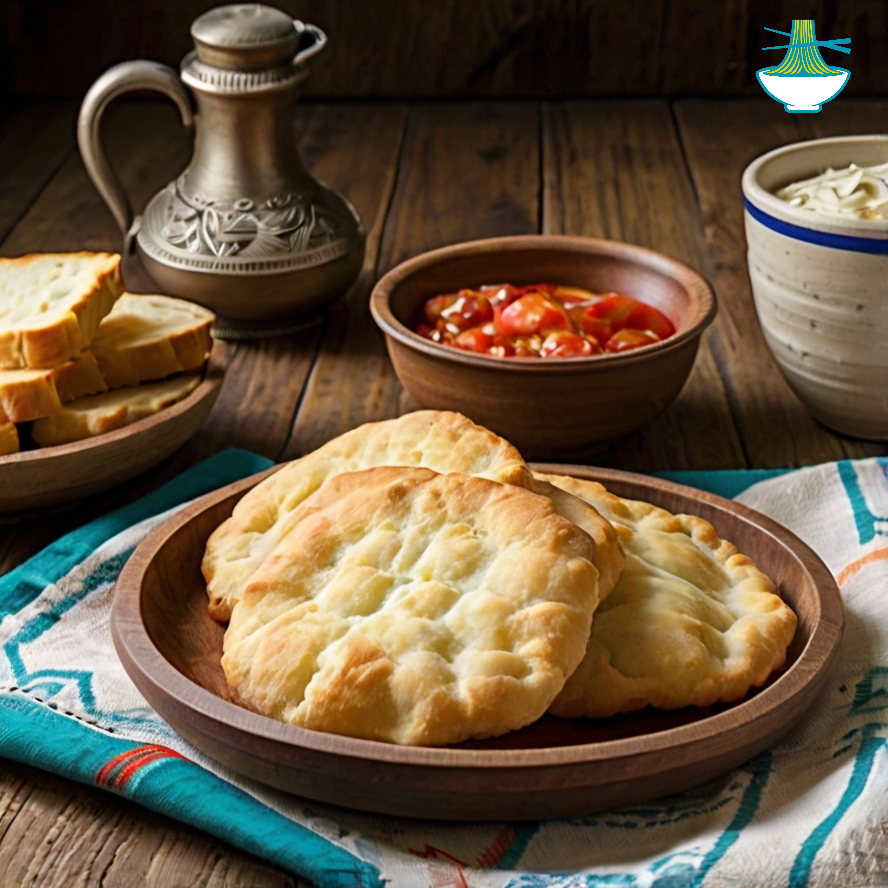Fry bread is a cherished traditional Native American dish known for its simplicity and versatility. This easy recipe allows you to make fry bread at home, offering a warm, golden treat that can be enjoyed sweet or savory. Originating from Native American communities, fry bread has evolved into a popular staple across various cultures, often served as a comforting side or a main dish.

Ingredients:
- 3 cups all-purpose flour
- 1 tablespoon baking powder
- 1 teaspoon salt
- 1 ½ cups warm water
- Vegetable oil for frying
Instructions:
1. In a large mixing bowl, whisk together flour, baking powder, and salt.
2. Gradually add warm water and mix until a dough forms. Knead the dough for a few minutes until smooth and elastic.
3. Cover the dough with a clean towel and let it rest for 10-15 minutes.
4. Heat vegetable oil in a deep frying pan over medium-high heat.
5. Divide the dough into 8-10 equal portions and shape them into balls.
6. Use a rolling pin to flatten each ball into a disk, about ¼ inch thick.
7. Carefully place each disk into the hot oil and fry until golden brown on both sides, about 2-3 minutes per side.
8. Remove the fry bread from the oil and drain on a paper towel-lined plate.
9. Serve hot with your choice of toppings, such as honey, butter, or savory options like shredded cheese, diced meat, or vegetables.
Notes:
- Avoid overworking the dough to prevent it from becoming tough.
- Use a slotted spoon or tongs to flip the fry bread in the hot oil and prevent splatters.
- Fry bread can also be baked at 375°F (190°C) for 10-12 minutes on a greased baking sheet if you prefer a lower-fat option.

Nutrition Value:
1. 3 cups all-purpose flour
- Calories: Approximately 1,380 kcal
- Carbohydrates: About 288 grams
- Protein: Around 12 grams
- Fat: Approximately 3 grams
- Sodium: About 0 milligrams
- Cholesterol: 0 milligrams
- Vitamins: Contains small amounts of B vitamins (thiamine, niacin, riboflavin)
- Minerals: Provides iron (around 6 mg)
- Nutritional Benefit: All-purpose flour is a primary source of carbohydrates, providing energy. It also offers essential B vitamins for metabolism and iron, which supports blood health.
2. 1 tablespoon baking powder
- Calories: Approximately 6 kcal
- Carbohydrates: About 1.5 grams
- Protein: 0 grams
- Fat: 0 grams
- Sodium: About 500 milligrams
- Cholesterol: 0 milligrams
- Vitamins: No significant vitamins
- Minerals: Provides sodium (about 500 mg)
- Nutritional Benefit: Baking powder helps the dough rise by producing carbon dioxide, contributing to the bread's texture. It also provides sodium, which is important for fluid balance and nerve function.
3. 1 teaspoon salt
- Calories: 0 kcal
- Carbohydrates: 0 grams
- Protein: 0 grams
- Fat: 0 grams
- Sodium: About 2,300 milligrams
- Cholesterol: 0 milligrams
- Vitamins: No significant vitamins
- Minerals: Provides sodium (about 2,300 mg)
- Nutritional Benefit: Salt enhances flavor and helps in regulating fluid balance, nerve function, and muscle contraction. However, excessive sodium intake can have negative health effects.
4. 1 ½ cups warm water
- Calories: 0 kcal
- Carbohydrates: 0 grams
- Protein: 0 grams
- Fat: 0 grams
- Sodium: 0 milligrams
- Cholesterol: 0 milligrams
- Vitamins: No significant vitamins
- Minerals: No significant minerals
- Nutritional Benefit: Water is essential for hydration and helps in the formation of dough. It supports overall bodily functions and aids in digestion.
5. Vegetable oil for frying
- Calories: Approximately 120 kcal per tablespoon
- Carbohydrates: 0 grams
- Protein: 0 grams
- Fat: About 14 grams (mostly unsaturated fats)
- Sodium: 0 milligrams
- Cholesterol: 0 milligrams
- Vitamins: Contains vitamin E (about 2 mg per tablespoon)
- Minerals: Contains small amounts of minerals depending on the type of vegetable oil
- Nutritional Benefit: Vegetable oil provides fats, which are essential for energy and absorption of fat-soluble vitamins. Vitamin E in the oil acts as an antioxidant, protecting cells from damage.


Comments